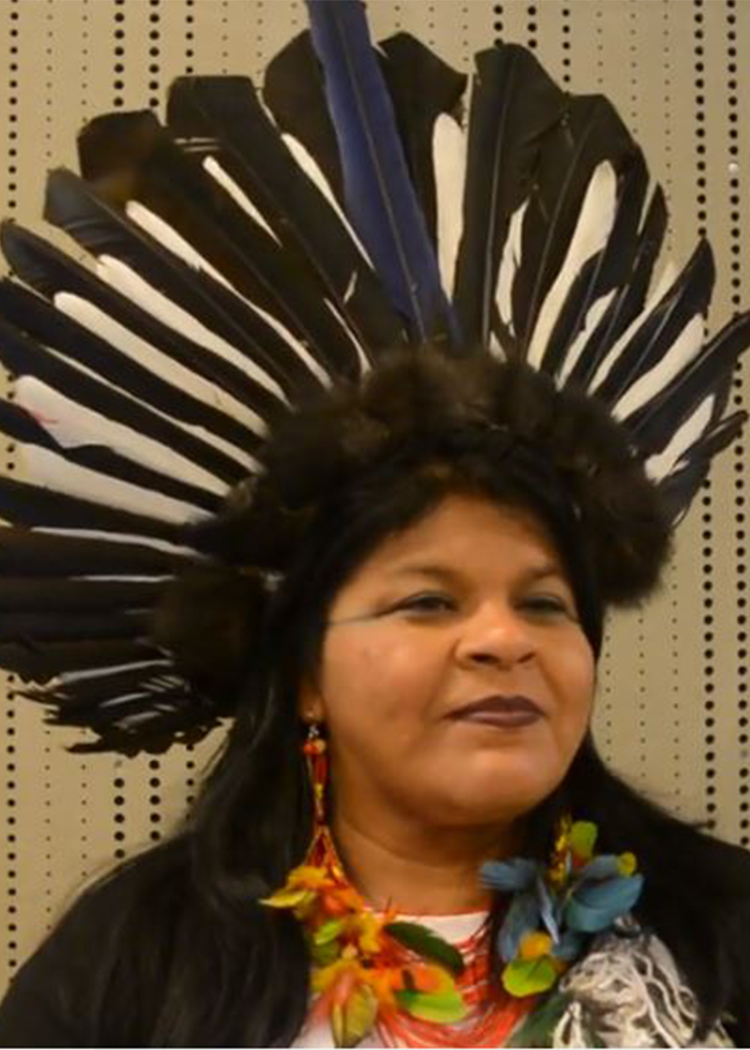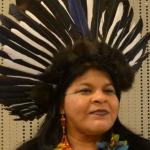Sônia, you are a very important indigenous leader in Brazil and your work has a lot to do with grassroots indigenous women. Can you explain how this traditional knowledge of indigenous women in your village is intertwined with nature conservation?
We have a living culture with festivities, songs and dances that strengthen our identity and our way of life. In order for us to live our culture, we need the forest standing, we need a living nature. So we are fighting every day. We have this extensive natural relationship with the environment, because without a protected environment, we cannot live our culture. Therefore, it is natural for us, in order to live our culture, to protect and conserve our ecosystems.
Through what traditional practices do you take care of Mother Earth?
We have our festivities. The “girl to woman” festivity, for example, is a celebration that happens in the summer. For this celebration, men go into the woods to hunt the animals that we use in our ritual, and the hunt also provides a way to monitor the territory. These are traditional practices that also strengthen our culture.
In your opinion, what are the priorities of indigenous women in relation to nature conservation? In your village, what are your priorities?
We, indigenous women, carry out several initiatives in the communities related to crafts, education and health. For us, it is very important for all this to happen in a satisfactory way within the communities, because it allows us to stay there, and our presence in the territory already prevents deforestation. That is why it is important that public policies, that the Brazilian government can be present, to provide the conditions for us to remain in our territory.
How do you think IUCN could more broadly promote and protect the priorities of indigenous women?
I think IUCN needs to recognize the role that Indigenous Peoples play in balancing the climate, in regulating rain, to recognize that the way of life of indigenous peoples contributes to the preservation and protection of the environment. Therefore, to think about conservation is to think first about the protection of cultural and social rights, guaranteeing the ways of life of people within their territories. Conservation is not only thinking about the vegetation, nor the landscape with the animals, but you also have to think about the people who live in there and secure the complete system.
There are strategic events coming up, like the IUCN Congress and the CBD COP. As an indigenous woman, what would you like to bring to these discussions about nature conservation? What would you like to see discussed and what do you want to see fulfilled?
We have brought many demands, many proposals. Every year, conservation modalities are discussed regionally, nationally, and internationally. I think the most important thing now is to put pressure on all these national and international governmental bodies to implement everything proposed here, to put into practice all these discourses, all these agreements. I think that, at this moment, the priority is to implement the agreements.
You now have the opportunity to send a message to the world, as an indigenous woman from Brazil. What would be your main message to the world?
The whole world needs to understand that the struggle for Mother Earth is the mother of all struggles.
About the author

Sônia Guajajara is a Brazilian indigenous activist, environmentalist, and politician. She is the Executive Coordinator of the Coordination of Indigenous Organizations in the Brazilian Amazon (COIAB).



